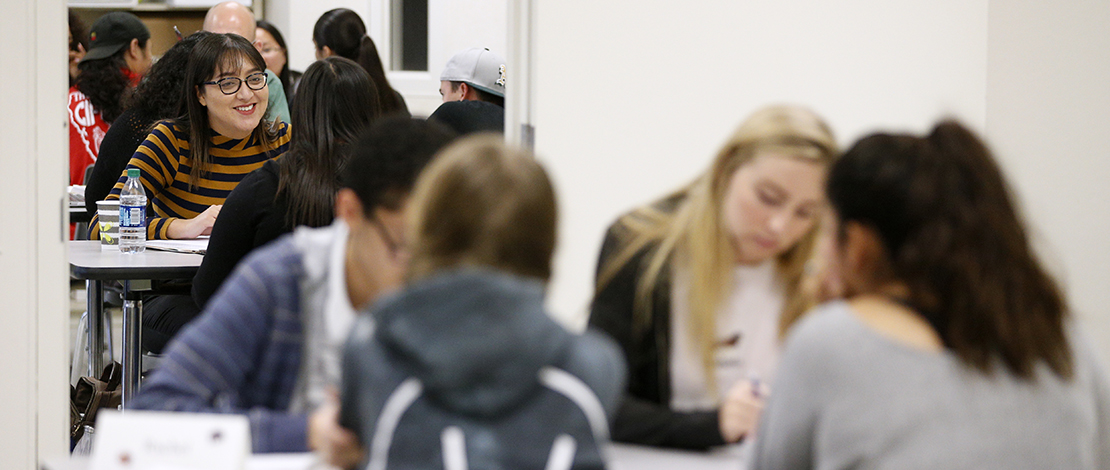Department of English

Student Resources
Students in English Department programs have a wide variety of challenging and engaging coursework to choose from in our department. You can also choose to participate in our student organizations, creative activities, publishing projects, and scholarly and literary events.
Includes independent study, independent reading, and thesis units.
Login to your Fresno State single sign-on, and then start here:
- Supervised Course Request (SCR) form — Graduate students (GRAD)
- Supervised Course Request (SCR) form — Undergraduates (UGRD)
Completed form for Spring 2026 is due to English Department office no later than Monday, February 9, 2026.
*Limit one form per each course request, please.*
After all participants have signed, your request will be processed within 3-5 business days. You can expect an email from the office with your class number and enrollment information.
Questions about the SCR process? Email the department staff.
Topics courses are taught seminar style, with substantial reading, research, and writing included.
Topics Courses – Spring 2026
ENGL 169T – Magical Realism (Womer)
Magical realism has deep roots in Latin American and African storytelling traditions and has become a popular contemporary literary style across genres. While most commonly associated with fiction, magical realism is being employed, more and more, in creative nonfiction, poetry, and hybrid genres as well. In this course, we’ll read and analyze a number of texts across genres and consider how the real-world setting, unexplained supernatural happenings, and literary tone work together to weave narratives of the everyday threaded with the extraordinary, and to what end.
ENGL 188T – Octavia Butler and Black Science Fiction (Mandaville)
Study of the novels, short stories, biography and contexts of this MacArthur Hugo and Nebula Award winning science fiction author. Her works have become graphic novels, inspired music albums and spawned (literally) religious devotees who aspire to a religion invented by one of her characters. Supplementary theory and research by others will help inform study of her works and contexts. Assignments include critical close reading responses, a creative imitation, and research essay. Students will use their scholarly work to write and submit a conference proposal (guided support in class for this).
ENGL 250T – Untimely Translations and Appropriations (Weston)
The course will explore the way cross-temporal manipulations of literary tradition forge complex networks of influence and identity. It will consider especially postmodern (current) takes on premodern (especially medieval) texts, and interrogate the untimely bonds and affiliations such projects can create. How do "translators" appropriate earlier texts and adapt them by additions, expansions, or deletions? What relationships between and among authors are forged across time by acts of translation? How do practices of translation aid in identity (as well as canon) formation?
ENGL 250T – Cultural Currents Between Europe and Asia in Modernism (Foster)
This course traces cross-cultural exchanges between Europe and Asia in modernist literature, philosophy, and art. It is often thought that modernism is a European aesthetic, but a study of Indian, Japanese, and Arabic literature and art reveal that modernist techniques are absorbed around the globe. A reading of British modernism likewise demonstrates that British literary figures and artists turn to Buddhist, Vedic, and Islamic traditions to articulate some of their ideas and concerns. This course looks at both the way modernist technique is adopted in Asia and the way British modernists turn to Asian traditions as a form of inspiration.
Seminars in English – Spring 2026
ENGL 193 – Lyric Essay (Church)
This course will examine the history and contemporary examples of the lyric essay form in creative nonfiction. We’ll look different sub-forms such as the collage, braided, and hermit crab essay, while considering the link between consciousness and craft. If nonfiction is “consciousness on the page,” then how does the genre handle neurodivergence and other ways of thinking about the world. Though the form itself is not new, the term “lyric essay,” is only about 25 years old and has since become a canonical term in the study of contemporary creative nonfiction. The course will endeavor to understand the form by reading both single-authored books as well as anthologies of lyric essays.
ENGL 193 – Shakespeare, Marlowe and the Early Modern Theatre (Weston)
William Shakespeare, actor and entrepreneur; and Christopher Marlowe, poet, spy, all around bad boy--two great playwrights creating (and disrupting) the canon. Complete with sex, murder, and conspiracy theories galore.
- Bulldogs for Recovery — Helps students learn healthier ways to cope with substance use, safe partying, etc.
- Career Development Center — Gives students a one-stop shop for job opportunities and professional development.
- Dream Success Center — Helps students who may have mixed or undocumented immigration statuses.
- Learning Center — Provides students with tutoring, supplemental instruction, academic success coaching, etc.
- Let's Talk Counseling — Gives students easy access to confidential and anonymous mental health counseling.
- Money Management Center — Helps students learn techniques for budgeting, credit, and debt management.
- Student Cupboard — An on-campus food pantry that provides students with free food and hygiene products.
- Student Health and Counseling Center — A full, high-quality on-campus health facility for students.
- Victim Advocacy Services — Provides confidential support to students impacted by interpersonal violence.
- Writing Center — Helps students with their writing assignments, from start to finish.